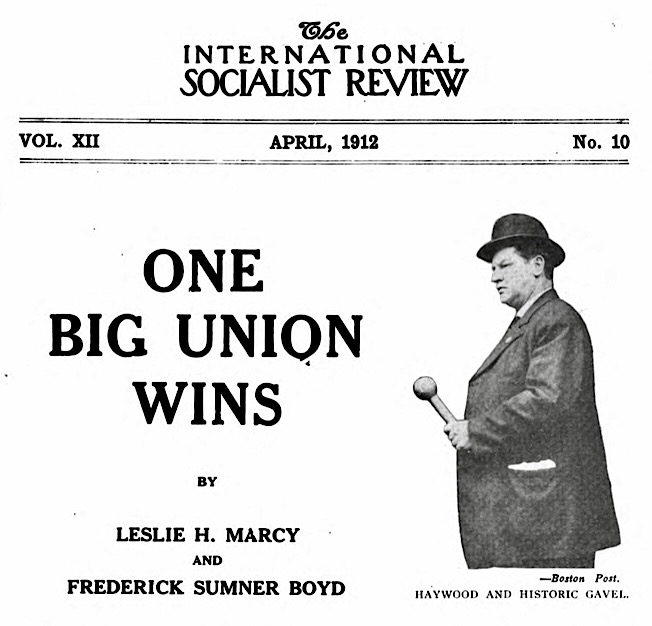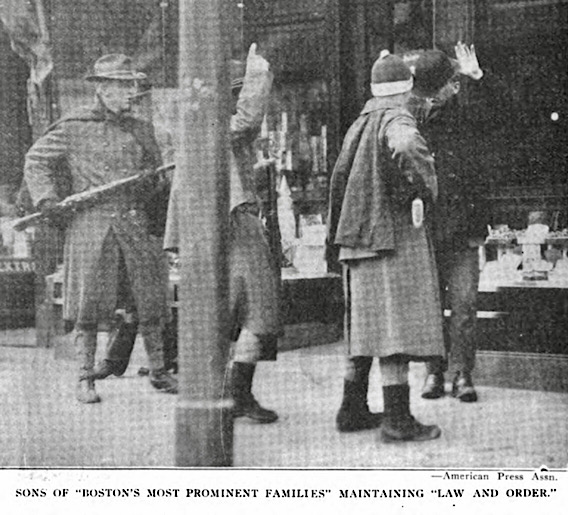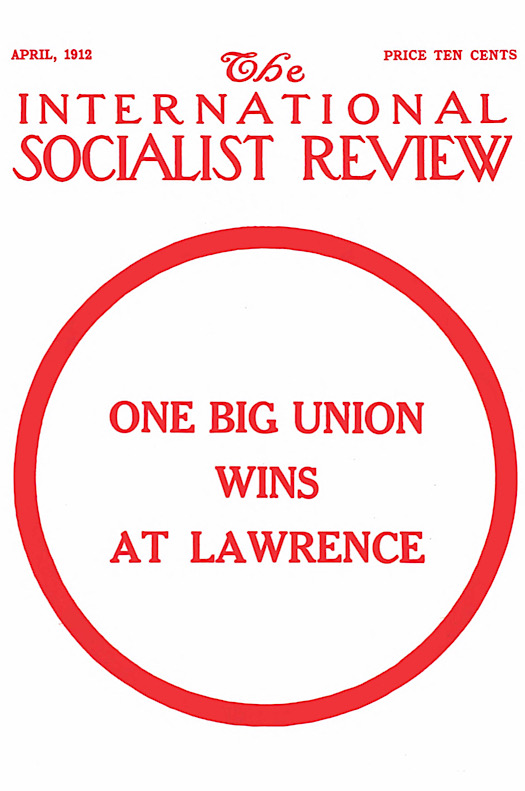 —————
—————
Hellraisers Journal – Wednesday April 3, 1912
Lawrence Textile Strikers Win Great Victory with I. W. W., Part I of IV
From the International Socialist Review of April 1912:
THE greatest victory in American labor history has been won by the Industrial Workers of the World in Lawrence, Mass., in a pitched battle of nine weeks’ duration against the most powerful cotton and woolen corporations in the world.
For fifty years the great textile corporations had reigned in New England practically unchallenged, save when ten years ago Tom Powers of Providence, R. I.. led a fierce battle against the American Woolen Company.
During the nine weeks of the fight in Lawrence every barbarity known to modern civilization had been perpetrated by police, military, courts and detectives, the willing tools of the bosses. Pregnant women were clubbed and their children delivered prematurely. Children were beaten in the streets and jails. Men were shot and bayonetted, the jail cells were filled, three year sentences were imposed for comparatively trivial offences, and machine guns were brought into the city.
And despite the abrogation without a shadow of legality of every constitutional right, including those of free speech and free assemblage, and despite the provocation offered by the presence of the bosses tools, twenty-two thousand strikers preserved, under the leadership of the Industrial Workers of the World, a self possession and a self-restraint that was little short of marvelous. Not one overt act was committed by the strikers. Not one desperate deed of an infuriated individual was proved against a striker.
For the first time in America’s labor history it has been demonstrated that a bitterly-fought battle between capitalists and workers can he conducted without the workers resorting to any form of violence. If any triumph is to be claimed for the I. W. W. this is one of the foremost of many.
The strike took its rise in hunger and was fought against hunger in the first place, and against excessive exploitation in the second. Sixty years ago, when Lawrence was little more than a village, and the mills were few and small, the daughters of New England farmers came from the farm to the mill to earn pin money. But as the years passed and the mills grew larger and more powerful there came into the city around the mills a class of people who depended entirely upon the mill for a living. They were first English, Irish and Scotch.
Later Germans and French Canadians began to enter and take their place in the mills. and for years these were the only nationalities to be found. Because the labor market was comparatively restricted and the mill owners were greedy for profits they sent lying emissaries through Europe, particularly to Italy, telling of the wealth of America. These men scattered literature broadcast, and showed pictures of the pleasant homes to be gained in the new land. One picture in particular showed a mill worker leaving the mill and on the way to a bank opposite.
Thus the Italian workers were lured to New England, and after them came in quick succession representatives of almost every nationality in Europe and Asia Minor, until today among others there are Syrians, Armenians, Russians, Portugese, Poles, Greeks, Franco-Belgians, Lithuanians, Letts [Latvians], Jews, Turks and Bohemians.
In the meantime the mills had grown and their power increased. Wages in 1912 were practically at the same level as in 1892, although they had been sometimes higher, and sometimes lower. And in 1912 they averaged $6 a week. With wages stationary during the twenty years when the cost of living has increased at least fifty per cent, the workers of Lawrence were faced with chronic starvation. Medical examination of the 119 children taken at random throughout the city and from all nationalities that were sent to New York showed them to be suffering from malnutrition; a condition that was not the result of the strike, during which living has been for large numbers of the strikers actually better than when they were at work, but that began with the mothers who carried and bore them, and was with them as they grew up.
Living conditions in the city were on a level with wages. Lawrence is a city of mills, tenements and a few houses and stores. The tenements are the dwelling places of the mill workers, each tenement containing an average of three floors of two to five rooms each, and every room small. Many of them are dark, and few have any pretense to sufficient ventilation.
In each apartment there exist two, three and even four families. In one apartment of five small, dark, lean-to rooms forming the top floor of one of these tenements were found three families, numbering in all seventeen people, men, women and children. One of the rooms used as a bedroom for five girls was the toilet, and all the seventeen people in the apartment had to pass through the bedroom of the girls to reach it. The toilet was out of repair at the time of the visit of the investigator, and the stench throughout the apartment was sickening.
One man, Dr. Michael Sullivan, of Lawrence, owns a large number of these tenements, and for two months the toilets have been frozen. In every other way they are in an abominable and filthy condition, but requests from his tenants for repairs have been refused, or ignored. All the tenants are strikers, and Sullivan has repeatedly threatened that unless they return to the mills and earn money for rent he will take out the windows and evict everyone.
Under such conditions it is not to be wondered at that the infant mortality of Lawrence is 400 in 1,000. That is a death rate that is tantamount to murder-the murder of the innocents.
The low wages destroy what is genially known as family life. Women-wives and daughters-work in the mills, and children enter them the moment they are over fourteen if they cannot be smuggled in before. The joy of rational life is impossible.
Looking over the state of Massachusetts and seeing something of these conditions with uncomprehending eyes, certain well-intentioned citizens known as reformers, after infinite pains and much pulling of many wires induced the legislature of the State to enact a law reducing hours of labor for women and children in the mills from 56 to 54 a week, the law going into effect January 1 of this year.
As has been done in practically every other State under similar conditions, the bosses availed themselves of the opportunity to cut down wages already at starvation point. And as men could not work unless the women and children worked also, wages for all mill workers were cut.
The cut amounted to about 26 cents. Against this the Industrial Workers of the World sent a committee on January 6 to protest. They were turned down at several of the mills when they asked that wages remain the same, and at one mill the committee was literally thrown down the office stairs.
The cut was a deliberate theft. When the 54 hour week went into effect orders were given to have the machines speeded up. One tooth was dropped from the main driving gear of the looms, increasing the number of picks by 45 an hour. The result was that the production was actually greater after the shorter hours than before, while wages were cut.
Anger was intense throughout the mills, and when on January 12 the pay envelopes of thirty weavers in the Washington mills were withheld without explanation the signal for revolt was given, and the entire mill struck, the workers parading the streets.
The parade went on to the Lower Pacific mill, which struck with the Washington mill workers. The next day, January 13, some 8,000 workers were on strike, parading the mill districts and holding mass meetings. January 14, while the strikers were parading past the Pacific mill, water from firemen’s hose was turned on them. This assault on parading strikers, made when the temperature was below zero, enraged the men and women and together they rushed the mill gates, entered the work rooms, demolished a few looms and induced the workers to quit with them. By January 14, the evening meetings were attended by some 25,000 strikers, all the other mills having struck in support of the original strikers. The strike in the Lawrence mills was general.
From the moment the Jewish and Italian workers went out, the I. W. W. took control of the strike, and subsequent developments make it necessary to state the position of the I. W. W. and the A. F. of L. in the city.
The textile workers of New England have been systematically betrayed by the A. F. of L. officials for years past. Beginning with the strike in New Bedford in 1898, when the bosses closed down the mills for twelve weeks, the National Secretary of the Textile Workers Union, Ross, used the situation to make political capital for his personal ends, and succeeded in making his way into the Massachusetts Senate, of which he is still a leading light. After twelve weeks the mills opened, and two weeks after the workers had gone back after terrible suffering and had gained nothing.
The next big massacre was in Fall River in 1904, when the bosses found their warehouses glutted with goods they could not get an overloaded market to take. A strike was the most opportune thing in the world for them, and for certain politicians. And a strike was called that also lasted for several months and became known throughout-the State as the “hunger strike.” John Golden was the moving spirit in this deal, and secured the aid of the Salvation Army and other charitable agencies to care for the starving workers.
This was the time when the Socialist Party had two members in the State legislature, several Mayors and other office holders, and everything pointed to a sweeping victory for the Socialist candidates in the elections that were drawing near. But John Golden and his A. F. of L. friends had other destinies for Massachusetts, and Golden, J. J. Driscoll of the Horseshoers Union, J. D. Pierce of the Cigar Makers Union, Jim Tracey, also of the Cigar Makers, and John F. Tobin of the Shoe Makers, together with some others, formed what they called a “flying wedge.” These men went around the State speaking in behalf of Douglas, a millionaire shoe factory owner, Democratic candidate for Governor, who was running with the avowed object of settling the Fall River “strike,” the understanding being that it was to be arbitrated and that justice would be accorded the workers.
The Socialists went down in disaster, and Douglas was elected. Douglas then fixed things with Golden so that the strikers of the Fall River mills went back to work for thirty days, pending the arbitration of the dispute. The arbitration board was appointed by the new governor, and the mill owners presented figures, based on their watered stock, that showed they had made no profits. These juggled figures were generously accepted, and the award of the arbitrators was that wages would have to be cut from 15 to 18 per cent. To this proposal Golden agreed, and the massacre was complete.
Meantime the Socialist Trade and Labor Alliance had formed a strong local in Lawrence in 1899. In 1900 came the split in the Socialist Labor Party, and that was reflected in the S. T. and L. A., which was rent asunder. Fragments of the organization remained in existence until in Sept., 1905, the I. W. W. formed a local in the city, and the older organization merged with it. The first I. W. W. local was mixed, containing representatives of all nationalities, until in 1907 a Franco-Belgian local was formed. The membership grew slowly but steadily, and in April, 1911, an Italian local was formed, and in October of the same year the Cloth Weavers’ Union, until then independent, merged with the I. W. W. When the strike broke out the membership numbered a few hundred.
At this writing the membership totals upwards of 12,000, and the various nationalities are organized into their respective language branches.
—————
[Emphasis added.]
~~~~~~~~~~~~~~~~~~~~~~~~~
SOURCES & IMAGES
Quote Lawrence Strike Committee, Drunk Cup to Dregs, Bst Dly Glb Eve p5, Jan 17, 1912
https://www.newspapers.com/image/430627498/
International Socialist Review
(Chicago, Illinois)
-April 1912, pages 613-30
https://www.marxists.org/history/usa/pubs/isr/v12n10-apr-1912-ISR-gog-Corn.pdf
See also:
Tag: Lawrence Textile Strike of 1912
https://weneverforget.org/tag/lawrence-textile-strike-of-1912/
~~~~~~~~~~~~~~~~~~~~~~~~~
Bread and Roses – Windborne



